The Dodgers keep winning. But Los Angeles is losing
Baseball and politics collided in 2025. Temperatures are rising, and Trump is fanning the flames.
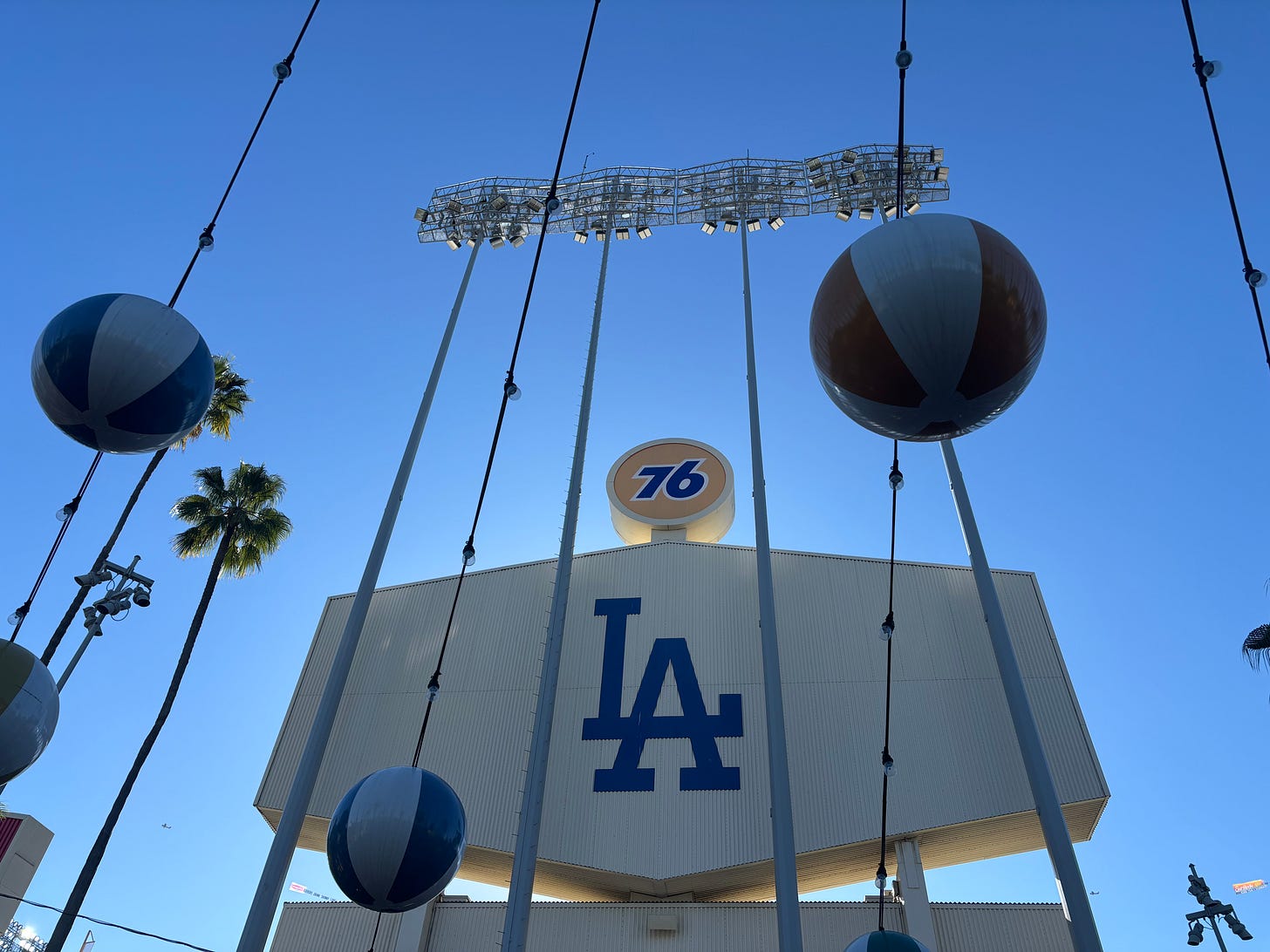
Two nights before the Dodgers won their second straight World Series in spectacular fashion, my wife and I drove down the 405 and 110 freeways to an oil refinery near the Port of Los Angeles for an extremely strange Halloween party.
When we got there, we found hundreds of cars, maybe thousands, enduring bumper-to-bumper traffic in the eerie glow of industrial smokestacks, the neighborhood reeking of diesel. After 45 minutes, we finally entered a refinery parking lot, where we rolled past inflatable ghosts and ghouls while a deejay in a Dodgers hat played spooky tunes. Folks working the event tossed 15 bags of caramel corn — seriously, 15 bags! — through the open window of our car.
It was over in two minutes. Personally, I didn’t get the appeal.
But the real attraction — the reason this Halloween drive-through has remained a beloved tradition in L.A.’s Wilmington neighborhood, even as refinery owner Phillips 66 faces accusations of violating the Clean Water Act and conspiring to cover up the climate crisis — is a storage tank painted to look like a giant jack-o’-lantern. The faux-pumpkin is called Smilin’ Jack.
When Phillips 66 announced it would close the refinery in late 2025, locals wanted to know: What would happen to Smilin’ Jack?
The pumpkin is an ingenious public relations ploy. Greenwashing at its finest.
And sadly for me, a die-hard Dodgers fan, the Boys in Blue are complicit.
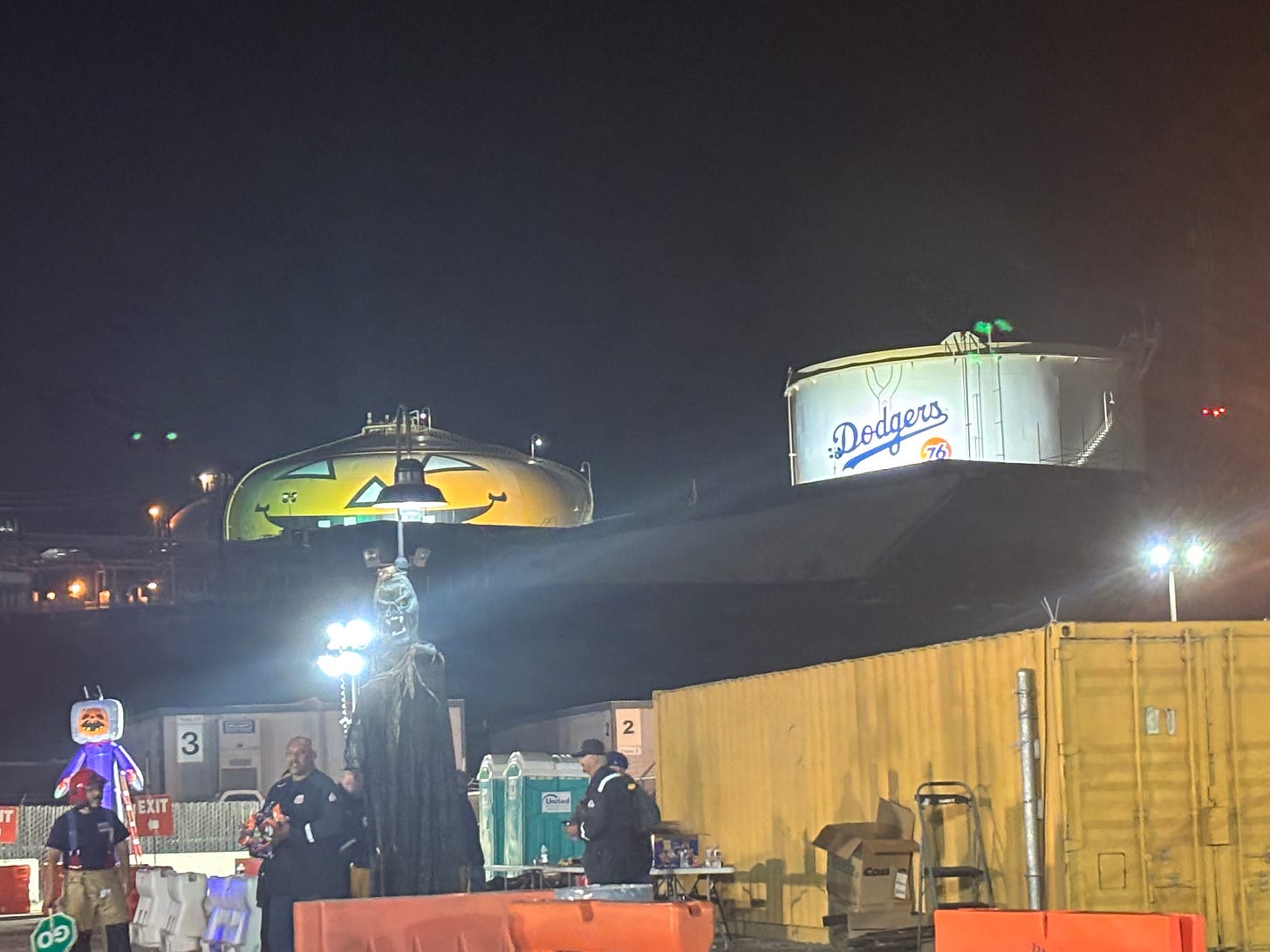
Not far from Smilin’ Jack, a second tank is painted to look like a Dodgers jersey, the product of a partnership between Phillips 66 and the team’s official charity. Phillips also owns 76 gasoline, a prominent Dodgers advertiser for decades.
So even as I rejoiced watching Yoshinobu Yamamoto close out the World Series, I couldn’t help think: The Dodgers are winning, but Los Angeles is losing.
Because as much as I love this team, its owners didn’t do two of the most important things they could have done for Angelenos this year. They didn’t take a stand against climate pollution after a year of devastating fires. And they didn’t stand up for L.A.’s Latino communities during a moment of unprecedented peril.
To borrow some syntax from Vin Scully: In a year that was so political, the predictable happened.
The Dodgers had their chances to show leadership.
In March — two months after deadly wildfires worsened by global warming rocked L.A. County — California Senate Majority Leader Lena Gonzalez wrote to Dodgers owner Mark Walter, asking him to drop all oil and gas sponsorships. Her letter built on a petition, now signed by 28,500 people, urging the team to cut ties with Phillips and its 76 gas station chain, whose ads are ubiquitous at Dodger Stadium.
Although the Dodgers wouldn’t comment at the time, I can now report exclusively that team president Stan Kasten wrote back to Gonzalez in March, saying the team had “no plans to alter our long-term sponsorship agreement with Phillips.”
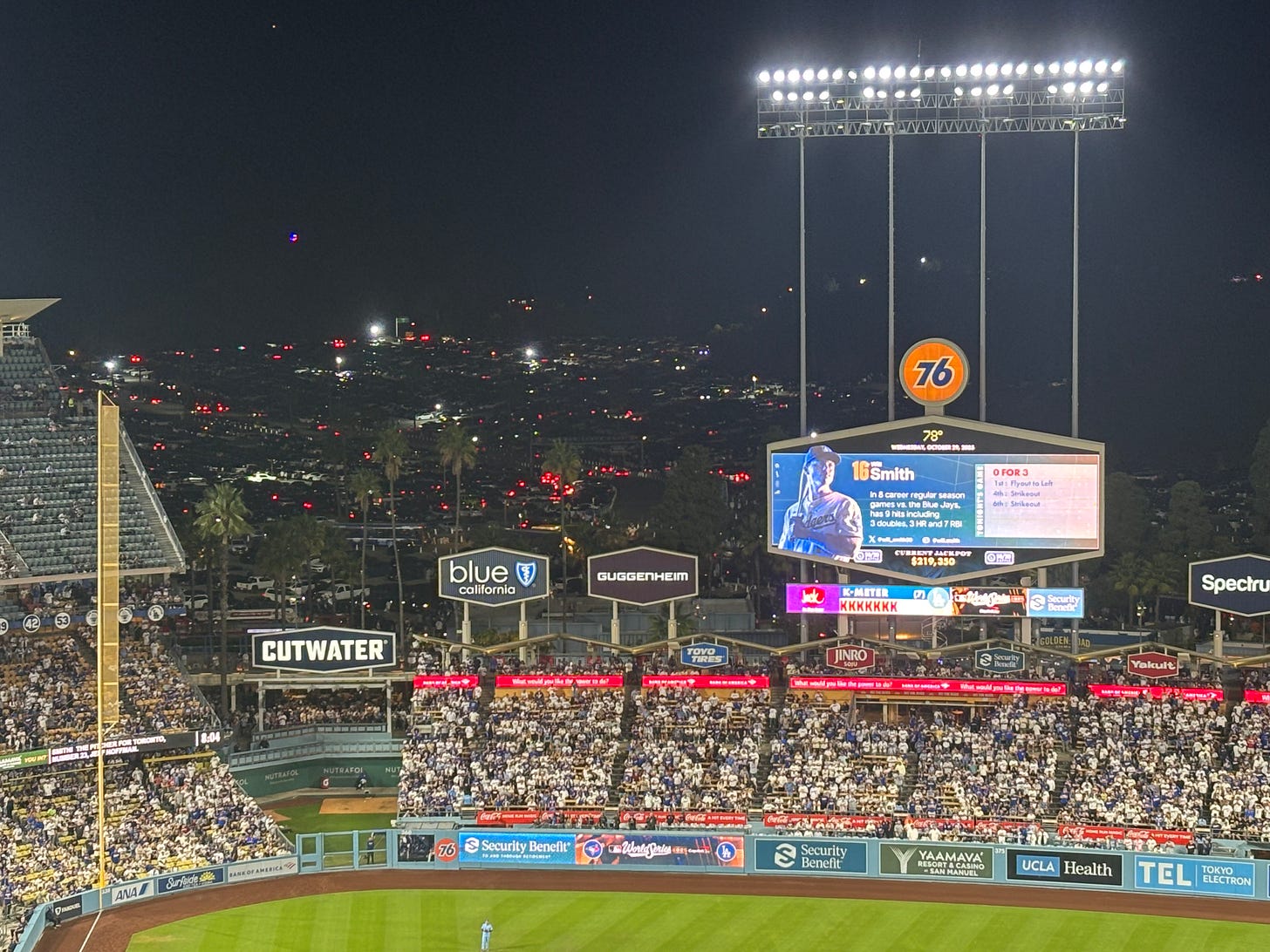
The team’s response to President Trump’s violent immigration raids was even more disappointing.
When Trump sent ICE agents, Marines and National Guard troops to Los Angeles — striking terror into the hearts of millions of brown-skinned Angelenos, documented and undocumented — the Dodgers initially refused to comment (even though nearly half their fans are Latino, and L.A.’s pro soccer teams quickly weighed in). Only when federal agents tried to access the stadium parking lots did the team cough up a weak, vague statement.
To their credit, the Dodgers pledged $1 million to assist immigrant families and indicated they would make additional announcements “in the coming days.”
Nearly five months later, though, there have been no additional announcements.
It’s hard to know what Walter and his co-owners really believe — about immigration, or fossil fuels, or anything else remotely political. They’d probably like to keep it that way. Before the Dodgers visited Trump at the White House in April, to celebrate their previous championship, Kasten responded to public criticism by insisting the trip had “nothing to do with politics.”
An understandable but unconvincing deflection. Of course baseball and politics are intertwined. Of course multibillion-dollar sports teams, with their enormous cultural and economic sway, are political enterprises. In 2025, the Dodgers put an exclamation point on that fundamental truth.
But really, they’ve been proving it for 60-plus years.
To make way for Dodger Stadium, the city of L.A. bulldozed three Mexican American neighborhoods, forcibly removing some families from their homes. It took decades for the Dodgers to recover from that sin and win over Latino fans en masse.
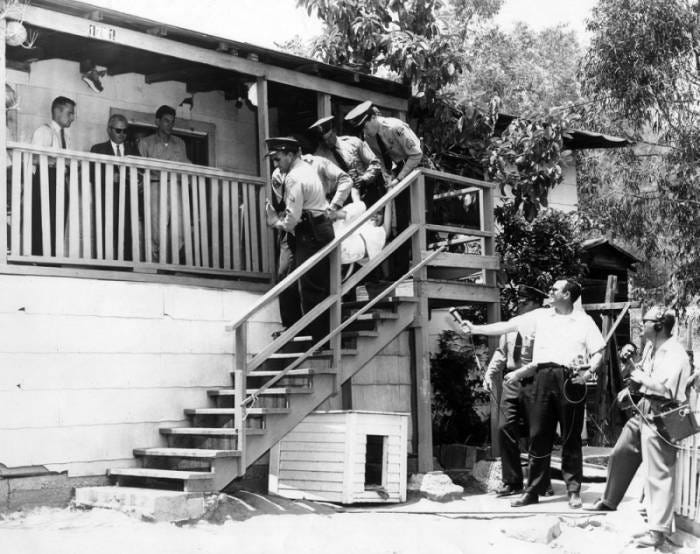
Even now, the team refuses to own up to the land grab. After Gov. Gavin Newsom vetoed a bill last year that could have led to reparations for the displaced families, I discovered the Dodgers had lobbied on the bill — a revelation that shocked its author, then-Assemblymember Wendy Carrillo. Although the team refused to say how it had lobbied, Carrillo figured the Dodgers got the bill killed.
The Dodgers didn’t respond to my questions for this piece. Ever since I first asked them about Phillips 66, that’s how they’ve dealt with my inquiries: Silence.
If they’re betting any political noise will by drowned out by on-field success — well, so far they’ve been right. They sold a record 4 million tickets this season. Few people have shown up to Phillips 66-related protests.
But I’m guessing the Dodgers can’t outrun politics forever.
For one thing, Trump has three years left in office. How long until the next collision between the team and the feds? What’s the breaking point for frustrated fans?
As it happens, after I drafted that last paragraph, the L.A. Times reported Tuesday that dozens of federal immigration agents had once again gathered outside Dodger Stadium, amassing in a parking lot used by the team.
Walter should avoid the temptation to see 2025 as a one-time needle he’s managed to thread, and instead consider it a preview of what’s coming. He needs a long-term plan to show Angelenos he’s with them —not with a deeply unpopular president.
Declining Trump’s latest invite to the White House is an obvious starting point. Make an excuse if you have to, but don’t go.
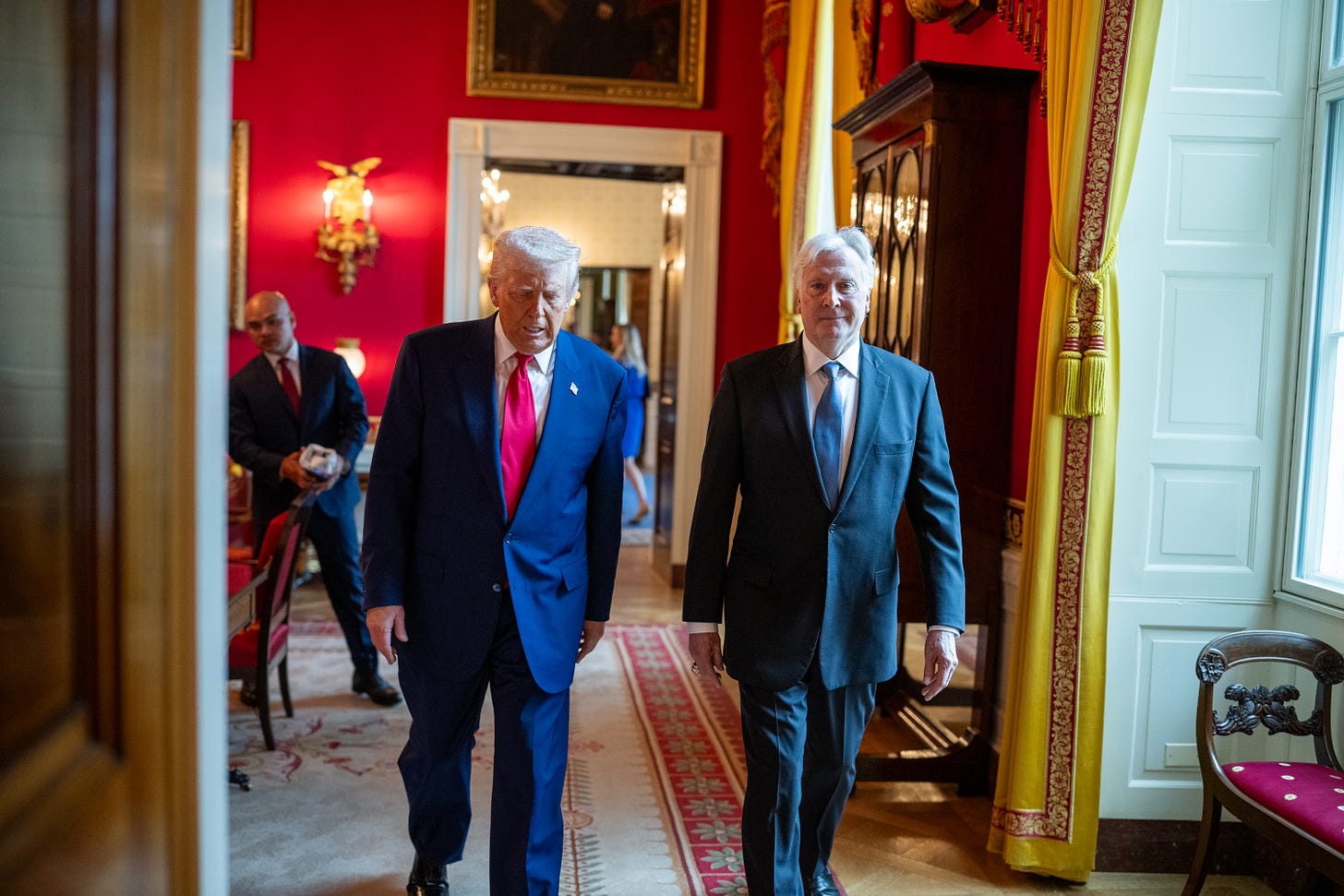
And as for Phillips 66?
I’ll admit that doing business with Big Oil is an easier sell for most Angelenos than staying silent in the face of ICE roundups, even if fossil fuel greenwashing should generate plenty of outrage. The same folks most at risk from Trump’s immigration raids (low-income people of color) are the same folks hurt first and worst by extreme heat, air pollution and other harms of oil and gas combustion.
Gonzalez, the senator who asked Walter to dump Phillips 66, sees fossil fuel emissions and immigration enforcement as part of the same struggle.
“Our communities are suffering now more than ever from a variety of threats — from increased air pollution as federal environmental protections are rolled back to cruel, inhumane immigration enforcement impacting longtime California residents,” she said in a written statement. “I am a lifelong Dodgers fan, and I continue to urge the team to stand by our communities that are suffering in this moment.”
Even if the Dodgers won’t reject oil industry advertising, there’s something else they can do to clear the air. Literally.
Two days before my diesel-choked refinery excursion, I walked 20 minutes from my Palms apartment to the local Metro station and boarded the E Line. A single transfer brought me to Union Station, where I hopped a free bus to Dodger Stadium for Game 4 of the World Series.
The trip was slower than driving but way cheaper than paying for gas and parking (and a lot more fun than sitting in traffic). The key ingredient was the bus, without which I would’ve had to walk another 45 minutes.
L.A. County funds the Dodger Stadium Express buses — which also run to and from the South Bay before and after every game — with no support from the team. They’re a huge success, serving about 400,000 riders this season. Metro estimates they’ll cost $2.7 million to operate next year.
The agency wants the Dodgers to start contributing.
“The state and county grants that originally funded the service have since expired. Metro now bears 100% of the operational costs of both routes,” the Metro board said in a June motion. “While the Los Angeles Dodgers have long allowed the use of their brand in marketing materials, they have not contributed financially.”
A recent presentation from Metro’s chief operations officer described conversations with the Dodgers as “ongoing.” This is an easy one: The team should pay up.
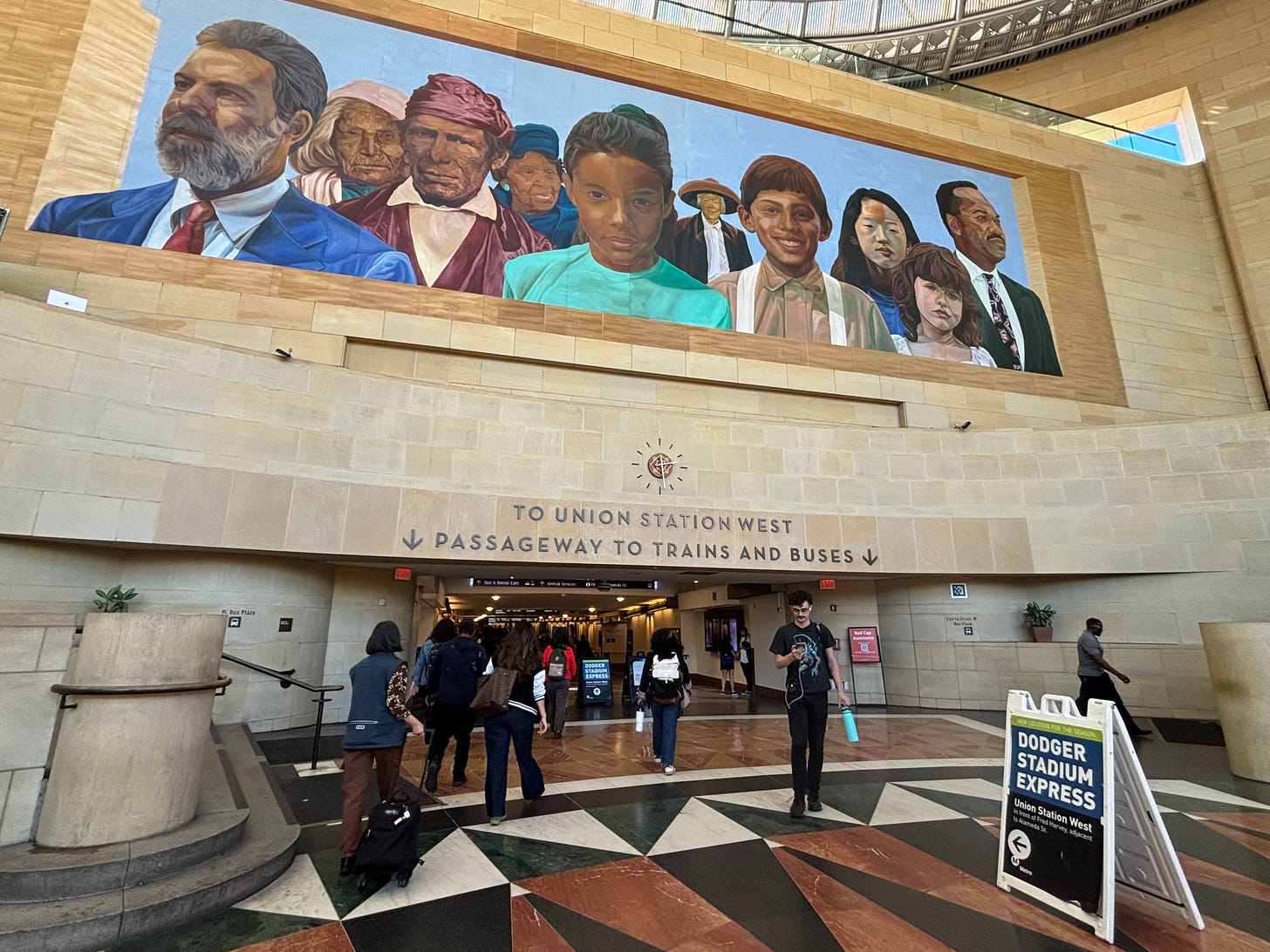
Supporting public transit wouldn’t make up for the Phillips 66 greenwashing. But it would be a good-faith gesture from a team that has zero electric vehicle chargers in its parking lots, in a county where one-quarter of new car sales have been EVs or plug-in hybrids for three years running.
And if the Dodgers want to do more? They could help Metro expand the bus service, adding lines serving additional neighborhoods. Even better, they could pay for electric buses. The current Dodger Stadium Express fleet runs on natural gas, which is cleaner than oil but still a lung-damaging, planet-warming fossil fuel.
To my mind, all these steps — supporting clean public transit, staying away from the White House, eventually cutting ties with Phillips 66 — would be classic Mark Walter. He’s made the Dodgers the most successful franchise in baseball largely thanks to his long-range thinking. Instead of worrying exclusively about this season or next season or even the next five seasons, he’s signed star players to record contracts and invested in world-class facilities with longer time horizons in mind.
In L.A., the future includes far less oil. Angelenos will still be pumping gas for years, but Phillips 66 is closing its refinery for a reason.
The city will also spend years recovering from the brutality of Trump’s immigration policies. If the Dodgers don’t tread carefully, they risk alienating a generation of fans — just like they did with the construction of Dodger Stadium.
In Wilmington, ironically, Phillips 66 is looking to the future. Just before Halloween, the oil company and its partners released concept art for the commercial development slated to replace the refinery. The images show a pumpkin-shaped play structure for kids — a nostalgic nod to Smilin’ Jack.
There are no Dodgers logos to be seen.



Thanks for keeping the Dodgers' feet to the fire on this issue, Sammy. Going forward, nobody who cares about the environment or social justice should ever buy a new gas car. Only EVs. With the surge in EV sales over the past 5 years, there are now lots of great used EVs that are affordable to even low income car buyers. One of the reasons cited by Philips 66 for closing its refineries is the market penetration of electric vehicles. Let's squeeze their profits constantly until all their refineries close.
There's a plot line in Ted Lasso that has echoes of the Phillips 66 story. The main difference is that it was a player taking a stand rather than the fans.
So what do the Dodgers players think of all this? If Ohtani says he's uncomfortable with the affiliation to Phillips 66, the owners would be very inclined to listen, right?
Do players feel like they don't know enough about climate chance to speak out? Or are they afraid of being blacklisted by teams?